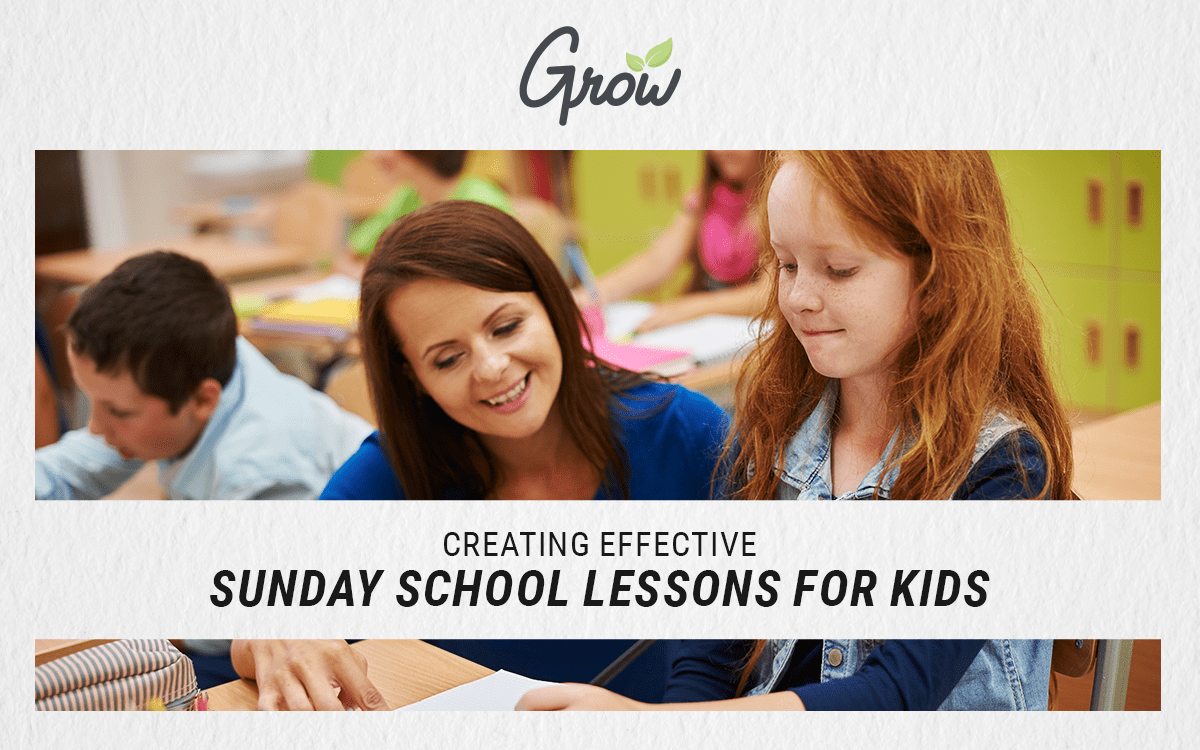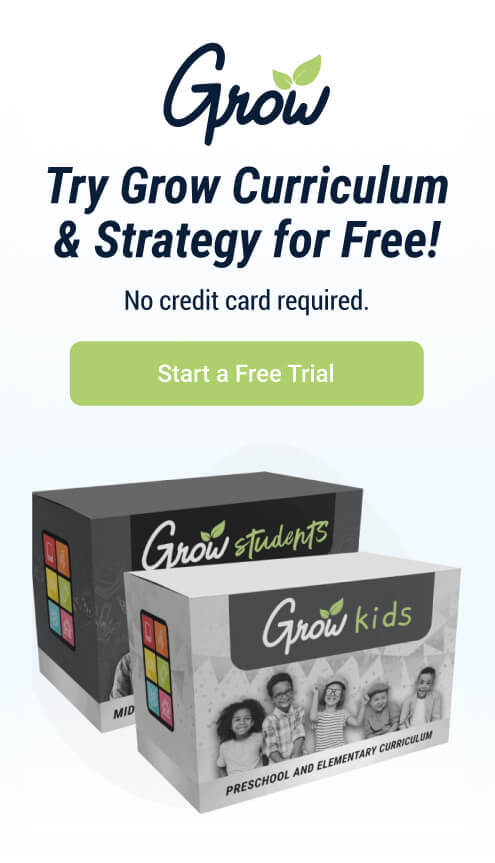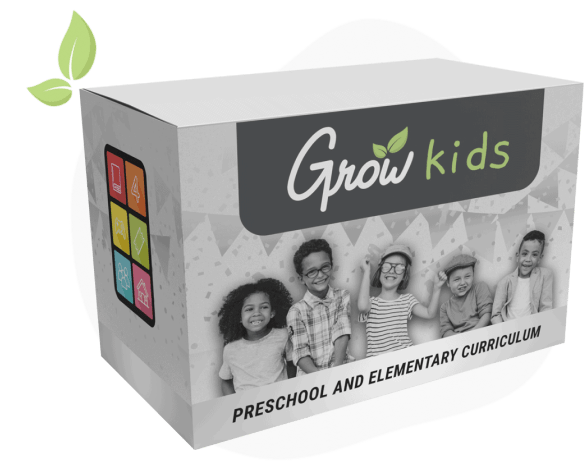
4 Tips for Small Group Leaders
Being in a leadership role of any kind can feel intimidating, and small group leadership, helping others grow in Christ is no exception. Whether you’re leading a small group discussion for kids, teenagers, or grown-ups, it’s not always easy to know what to do, if you’re doing it well, or how to get better. We’ve got tips and resources like Grow Curriculum to show you how to be a good small group leader and build your confidence level.
Leading a Small Group
If this is your first Sunday ever leading a small group or even if you’ve been a small group leader for years, these 4 tips will help you make the most of the time you have with your group.
Tip #1: KNOW YOUR ROLE
Your overall role as a small group leader can be broken down into 3 parts:
- You’re a guide. While not an easy role to define, you’re…sort of a mentor. Sort of a pastor. Sort of a friend. Sort of a teacher. But you’re not exactly any of those things. Rest assured that you’re not meant to have all the answers — you’re there to help lead a conversation that will help your small group find truth together.
- You’re a facilitator. While it’s important to know your material and the Scripture you’ll be teaching, that’s not quite enough for this role. You also have to know how to facilitate a conversation by drawing people in, asking a variety of types of questions, learning when to push for more and knowing when to back off.
- You’re a person. This role is inherently a relational one. You can’t lead a small group effectively without also building deep relationships with the people in your group.
If you’re leading a small group of kids, teenagers, or grown-ups, the age you work with is going to have a big impact on your specific role.
- If you’re leading kids curriculum, your job is going to involve some weird smells, short attention spans, silly voices, and messy crafts. Patience and a big smile will be key!
- If you’re leading youth curriculum — well, you’re still going to have to deal with some weird smells and short attention spans, but you’ll also need to handle some harder questions, bigger drama, and deeper thinking. Flexibility, adaptability, and exceptional listening skills will serve you well.
- If you’re leading a small group of adults curriculum, you’ll be managing even more complex relationship dynamics, people with potentially vastly different experience levels with Scripture and the church, and probably some people with a lot of baggage to unpack. Empathy and understanding will be helpful, but also knowing when to move the conversation forward.
Once you’re clear on your specific role, you will be better equipped to set goals for your group.
Tip #2: KNOW YOUR GOAL
If you’re leading a bible study or other small group, chances are the ministry you’re serving with gave you some goals already. Ideally those goals should already be aligned with your church’s big picture mission and strategy.
But if you’re unsure of what your goals are, here’s a way to look at it that might help.
Your goal is to help someone take the next step in their faith journey.
- This is a goal that motivates and guides everything we do. Helping someone take a step toward owning their faith is what we consider a “big win.”
- Spiritual growth is a journey and no two journeys are identical, so taking that step will look a little different for each person.
But one overarching goal can be difficult to work toward unless you break it down into more manageable steps. In that case, it’s helpful to set smaller and more specific goals that are dictated by a bigger picture strategy — like a discipleship strategy. As you work on the smaller goals for leading your small group, be sure to get feedback from your pastor and peers. We’re all in this together!
Supplemental image [leader sitting with and working with teens?]
Tip #3: DISCIPLE HOLISTICALLY
As a small group leader, you’re probably not the primary discipler of the people you lead. Parents, mentors, pastors, and family members might fill that role more often than you do. But as a small group leader, you are part of the discipleship process for the people in your group.
You’ve probably heard the word “discipleship” quite a bit, but let’s be honest — it’s a word a lot of people have defined differently.
We like to think of discipleship in terms of 4 spiritual habits. When these spiritual habits are practiced regularly, they allow a holistic kind of discipleship to take place.
- Spend time with God: Open the Bible on your own and have regular conversations with God
- Spend time with others: Engage in healthy community and relationships
- Use your gifts: Identify unique gifts and use them to love God and others
- Share your story: Make faith an everyday topic of conversation
If a person only practiced one or two of these habits regularly, it’s easy to see how their discipleship journey wouldn’t necessarily be complete, well-rounded, or holistic. As a small group leader, it’s your role to challenge and encourage everyone in your group to grow spiritually in a way that is also holistic — and you can do that by focusing on all 4 spiritual habits regularly.
So back to goals. If you want to turn these ideas into actions, try identifying four goals for your group every month, quarter, or year — and make sure each of those goals aligns with one of the four spiritual habits. Here are some examples to consider:
- Habit – Spend time with God:
- Assign Scripture reading homework
- Share prompts to use for private prayer time
- Habit – Spend time with others:
- Organize a voluntary social outing for the group
- Role play healthy relationship examples and conversations
- Habit – Use your gifts:
- Work through a quiz to identify gifts and talents
- Have small group members anonymously share what they think each member’s gifts are
- Habit – Share your story:
- Ask members to write about how God has worked in their life recently
- Encourage members to speak in front of the group about their testimony
It doesn’t stop with knowing and setting goals for your small group. You’ll find that you will need to keep updating and refining what you’re doing.
Tip #4: KEEP LEARNING
Those first three tips cover some of the basics of being a small group leader, but that’s not where this ends. There’s no certification course for leading a small group that teaches you everything you need to know. There’s a lot of learning on the job you’ll need to do, like . . .
- Get better at asking for help
- Figure out how to engage the introverts while managing your extroverts
- Find resources to help someone experiencing a crisis you’ve never dealt with before
- Work on balancing deep conversation with fun bonding experiences
- Research the complicated questions, issues, and ideas your group members bring up
- Learn from your mistakes
Never stop learning. It’s well-known that leaders are more effective when they keep learning and growing. You might be leading a small group, but you’ve still got a lot of growing to do too.
Don’t be afraid to jump into small group leadership! With the help of God, your ministry leaders and peers, plus our 4 tips and awesome resources, you’ll be ready to step into the role you’ve been called to serve in and lead with confidence.



Grow Curriculum is here to ease the burden of small group leadership, by providing:
- Small group questions for every week (separate kids, students, and adult curriculums)
- Volunteer meeting outlines for training on specific topics
- Monthly tip videos on how to be a better small group leader
- A volunteer handbook to help you understand your role

The Grow Team
A team packed with pastors, ministry leaders, writers, editors, designers, project managers, app developers, and more! The Grow Team works to bring curriculum and ministry strategy to church leaders everywhere.
Related Posts
4 Tips for Small Group Leaders
By The Grow Team
How to Ask Better Discussion Questions at Youth Group
By The Grow Team
Creating Effective Sunday School Lessons for Kids
By The Grow Team












In this post, here’s what we’ll cover: